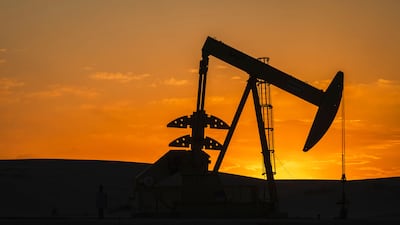Activity in the US oil and gas sector rose slightly in the first quarter, although President Donald Trump's tariffs are a source of rising uncertainty among shale-oil executives, according to a new survey from the Federal Reserve Bank of Dallas.
The quarterly survey noted there was increased pessimism among the 130 energy companies it polled this month. The company outlook index fell by 12 points to minus 4.9, while the outlook uncertainty index jumped 21 points to 43.1.
The Federal Reserve Bank of Dallas is one of 12 under the US Fed system. The Dallas Fed consists of Texas, northern Louisiana and southern New Mexico, and covers the Permian Basin, which is the largest producing oilfield in the country.
The survey also found companies need $65 per barrel on average to drill profitably, higher than last year's response at $64 per barrel.
Survey respondents expect West Texas Intermediate (WTI) oil price to end at $68 per barrel by the end of this year before climbing to $74 in two years and $82 in five years.
Mr Trump has planned to implement a 25 per cent tariff on all steel imports, and his wish to bring crude prices to $50 per barrel has rankled with executives surveyed by the Dallas Fed.
“'Drill, baby, drill' does not work with $50 per barrel oil. Rigs will get dropped, employment in the oil industry will decrease, and US oil production will decline as it did during Covid-19,” one anonymous executive wrote.
Another expected production to immediately decline at $50 per barrel.
“This is not 'energy dominance.' The US oil cost curve is in a different place than it was five years ago; $70 per barrel is the new $50 per barrel,” they said.
Others noted the uncertainty over Mr Trump's approach towards tariffs. The President has spent his first two months in office threatening to impose levies on trading partners, before altering or removing those threats altogether. On Wednesday, he was expected to announce new levies on car imports on April 2.
“I have never felt more uncertainty about our business in my entire 40-plus-year career,” one respondent said.
Another executive anticipated tariffs would most probably affect 2026 investment decisions, while yet another executive pleaded for more stability.
“The administration's chaos is a disaster for the commodity markets. 'Drill, baby, drill' is nothing short of a myth and populist rallying cry. Tariff policy is impossible for us to predict and doesn't have a clear goal,” they said.
The uncertainty around tariffs underscores a general uneasiness towards Mr Trump's trade policies. Contacts from across the Federal Reserve's 12 districts noted the rising uncertainty of their businesses because of tariffs, according to the central bank's monthly beige book of economic conditions.
“Contacts in most districts expected potential tariffs on inputs would lead them to raise prices, with isolated reports of firms raising prices pre-emptively,” the report said.
The Dallas district's economy expanded moderately, while non-financial services activity grew, retail sales were flat and manufacturing activity “was rather volatile”.
The report also said contacts in the district “noted sharply higher uncertainty around the outlook”.


